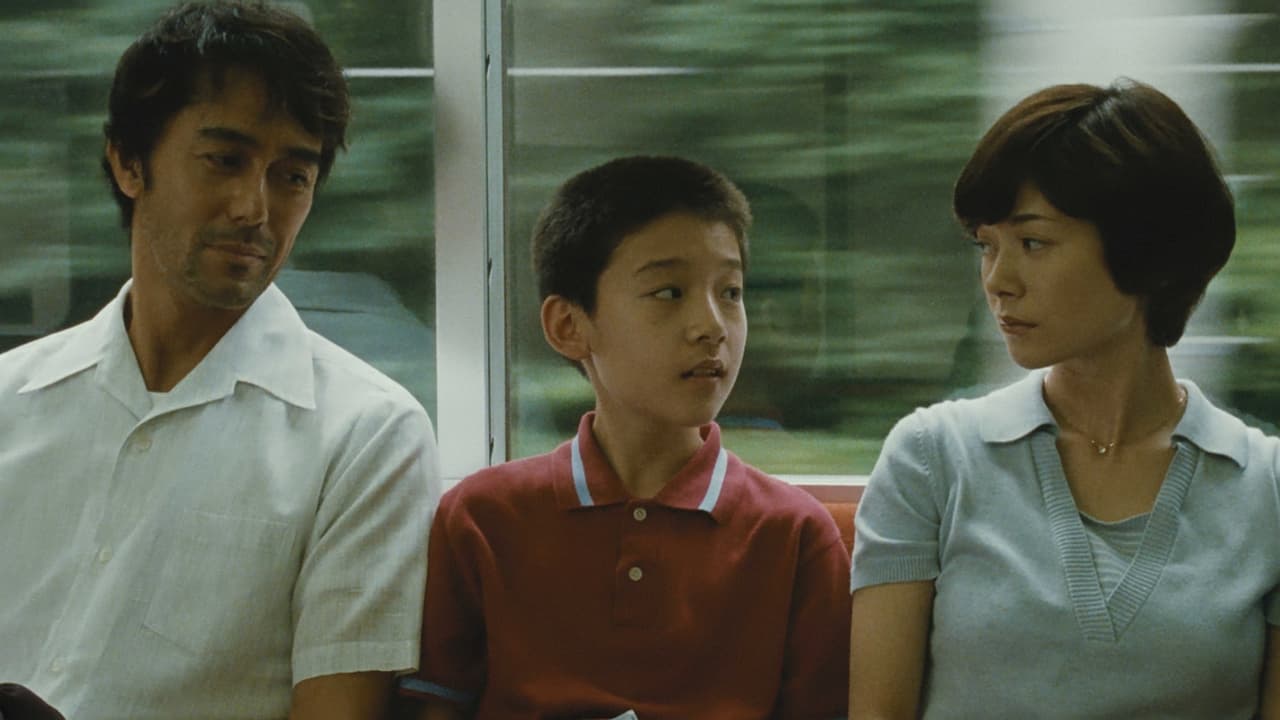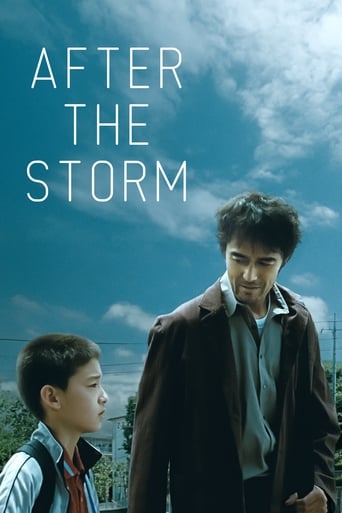SmugKitZine
Tied for the best movie I have ever seen
Myron Clemons
A film of deceptively outspoken contemporary relevance, this is cinema at its most alert, alarming and alive.
Yash Wade
Close shines in drama with strong language, adult themes.
Catherina
If you're interested in the topic at hand, you should just watch it and judge yourself because the reviews have gone very biased by people that didn't even watch it and just hate (or love) the creator. I liked it, it was well written, narrated, and directed and it was about a topic that interests me.
tenshi_ippikiookami
"After the Storm" is another great Hirokazu Koreeda movie. It is touching, it gives time to the characters and the plot to breathe and develop, and it gives food for thought. And all in a movie that doesn't try to over-complicate things.Ryôta is a failure. He started as a writer, published a book that got an award, and married and had a child. However, nowadays he just believes he writes, he's divorced, with a non-existent relationship with his son. He also tries to steal money from his mother. On top of that, he uses his 'job' in a detective's agency to extort people and to stalk his ex-wife. And all the money he gets he loses on bets or pachinko.What we get from here is Ryôta and his relationships with the people that surround him. And Koreeda does a great job in creating great moments from little moments. It helps that the plot keeps things straightforward but non-stop and that he has surrounded himself with great actors, from the always amazing Hiroshi Abe to funny and ironic Kirin Kiki. Just having the actors delivering the lines and their banter make for a great time. And it doesn't forget the more serious moments, as Ryôta's problems with gambling or his inability to deliver on the responsibilities and decisions he takes.Totally worth checking out.
writers_reign
A few months ago serendipity brokered a meeting between me and an exquisite film from Japan entitled Our Little Sister. I was totally captivated so much so that I watched it again within days and bought the DVD as soon as it appeared. This week another film by the same director - who also, it appears, works on the screenplays of his movies - was released in London. I found it had already been written about in glowing terms here on IMDb and I noted with interest that the comments came from several different countries around the world, testifying to the universal appeal of this minimalist filmmaker. It's difficult to conceive that this virtually invisible style of acting co-exists in the world of, say, Robert de Niro, Dennis Hopper, etc, where the goal seems to be last one to be sectioned is a sissy. After The Storm is yet another sublime essay about ordinary people coping with everyday traumas or not, as the case may be. Though it's churlish to single out any one actor it's equally hard not to wallow in the beautiful performance of Kirin Kiri as the mother/grandmother coping with the dysfunctional son and his fractured family. A true gem.
politic1983
While not yet proving to be quite as prolific as the great masters Ozu, Mizoguchi and Naruse at their most busy, there is becoming something routine about another year and another trip to Cannes for perhaps Japan's best current working director, Kore-eda Hirokazu. There is a clear progression from his bleakly haunting first three films, 'Maborosi', 'After Life' and 'Distance' to a more routine playground of 'shomin-geki' (lower-middle class family drama), moving from more complex ennui to a more mainstream exploration of various unusual family scenarios. 'After the Storm', the most recent lover he took with him to southern France, certainly feels like a follow-on from his previous works 'Still Walking' and 'Kiseki'. Here, the family get-together of 'Still Walking' is replaced by the impromptu night-in to weather the storm, with Kirin Kiki and Hiroshi Abe reprising their roles as mother and prodigal son; and 'Kiseki's' Koichi is replaced by Abe's Ryota: a grown man who can't move on from his divorce from his wife and son, Kyoko and Shingo. With the cast also featuring other now established Kore-eda 'family' members, in the form of Lili Franky and Yoko Maki, this could all start to feel a little too familiar. Though he would not be the first great director to embrace this approach.Suitably unshaven, Ryota is a recent divorcée, struggling to come to terms with his new position. A former novelist, enjoying some minor success with his novel 'The Empty Table' fifteen years previous, he now finds himself working as a private detective, betraying the trust of both his boss and untrustworthy clients; gambling heavily, living alone. Not only losing his wife and son, he has lost the respect of others, and even himself. His ex-wife can't rely on him to pay child support; his sister believes he is only after their mother's meagre funds; and his boss knows he is moonlighting behind his back. The only ones showing any positivity towards him are his mother, in the form of witty banter about how useless he has become, much like his father; his work colleague, Kento, who begrudgingly lends him money to gamble away; and his son, whose indifference to him is as good as he can get. His attempts to win Kyoko and Shingo back, in his sly, underhand manner, therefore, are never going to work. By purposefully taking Shingo to his mother's small apartment as a typhoon approaches , he hopes to lure Kyoko to spend the night as a family with his deceit, unable to grasp that it is acts such as this that pushed her away in the first place. He is a man above his station, and in pursuing his second novel, that everyone can see will never happen, turns down lucrative offers to write more mainstream manga, as he believes it compromises his artistic integrity which died long ago. His profession now to watch others, Ryota has become completely unaware of himself and the impact of his actions on those around him. Playing the victim, he is never the bad guy. Comparisons are often made to his father, harking to Kore-eda's previous title 'Like Father, Like Son'. Kyoko can see the future she would be offered with Ryota, in the form of her former mother-in-law's cramped apartment where she is forced to spend the night: As an elderly woman, left alone and near penniless by her husband's rash actions. Whereas Ryota can only see the past. Eventually realising that he is only deceiving himself (urgh, I just wrote that!), as the storm passes and the fresh morning awakes, he starts to come to terms with this. This may all seem quite obvious and light, wondering if Kore-eda has lost a bit of spark, getting too comfortable in his work. And indeed, you may wish for a more dark perspective as in his earlier days. But the realism holds, and the wit of the script raises a smile. The cast perform their roles in a way that is believable, avoiding soap opera clichés and social stereotypes; and the stark soundtrack steers it away from melodrama.Yes, this is more of the same, but in the same way that Ozu remade his own 'Late Spring' with 'An Autumn Afternoon'. The formula is working, and with enough bite to keep it away from the daytime TV nicety, ensuring that the familial isn't too familiar just yet. politic1983.blogspot.co.uk
Gordon-11
This film tells the story of a failing novelist who turns to be a private detective to make ends meet. He has a gambling problem unfortunately, therefore his salary goes to gambling instead of child support. His ex wife is less than happy, and threatens to stop monthly visits if he doesn't pay.The story is slow and uneventful, even though a storm is approaching. Viewers get a glimpse of the novelist's failing life, and it can be seen that he still lives in his pride from his award winning novel from over a decade ago. His interpersonal relationships are quite messed up, as he alienated his family members with his previous financial failures. On one hand, I do wish that his life will pick up and be great again, but on the other hand, I can't really care less. Most of the screen time, especially towards the end, I just wished the film would end soon because I was quite bored.

